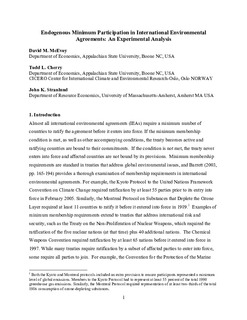Endogenous Minimum Participation in International Environmental Agreements: An Experimental Analysis
Journal article, Peer reviewed
Submitted version
Permanent lenke
http://hdl.handle.net/11250/2477650Utgivelsesdato
2015Metadata
Vis full innførselSamlinger
- Journal articles [478]
Originalversjon
Environmental and Resource Economics. 2015, 62 (4), 729-744. 10.1007/s10640-014-9800-1Sammendrag
Almost all international environmental treaties require a minimum number of countries to ratify the treaty before it enters into force. Despite the wide-spread use of this mechanism, little is known about its effectiveness at facilitating cooperation. We analyze an agreement formation game that includes an endogenously determined minimum participation constraint and then test the predictions using economic experiments. We demonstrate theoretically that players will vote to implement an efficient coalition size as the membership requirement and this coalition will form. Experimental tests of the theory demonstrate that the minimum participation mechanism is highly effective at facilitating cooperation when efficiency requires the participation of all players. However, when efficiency requires only a subset of players to participate, profitable coalitions are often deliberately blocked. In light of our results it is possible that equity concerns can impede the formation of international agreements when membership requirements allow free riders.
Beskrivelse
This is a post-peer-review, pre-copyedit version of an article published in Environmental and Resource Economics. The final authenticated version is available online at: https://doi.org/10.1007/s10640-014-9800-1
